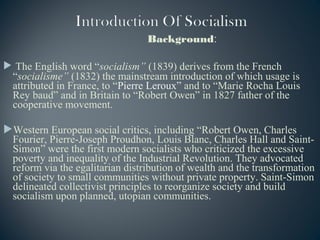Economic system
- 2. âĒ An economy, or economic system, is the way a nation makes economic choices about how the nation will use its resources to produce and distribute goods and services.
- 5. Socialism: âĒ An ideology arguing that citizens are best served by policies focused on meeting the basic needs of the entire society rather than on serving the needs of individuals as individuals.â
- 6. Background: ïĩ The English word âsocialismâ (1839) derives from the French âsocialismeâ (1832) the mainstream introduction of which usage is attributed in France, to âPierre Lerouxâ and to âMarie Rocha Louis Rey baudâ and in Britain to âRobert Owenâ in 1827 father of the cooperative movement. ïĩWestern European social critics, including âRobert Owen, Charles Fourier, Pierre-Joseph Proudhon, Louis Blanc, Charles Hall and Saint- Simonâ were the first modern socialists who criticized the excessive poverty and inequality of the Industrial Revolution. They advocated reform via the egalitarian distribution of wealth and the transformation of society to small communities without private property. Saint-Simon delineated collectivist principles to reorganize society and build socialism upon planned, utopian communities.
- 7. ïĩAbolition of private property. ïĩEquality, abolition of hierarchies in society. ïĩIslamic socialism succeeded in political mobilisation of the masses and Islamisation increased the role of religion in politics. ïĩSocialism provides all citizens with their survival needs, creating a stable social environment. ïĩ People who cannot participate economically (due to mental disabilities, age, or poor health) are still valued and cared for.
- 8. ïĩCriticisms of socialism range from claims that socialist economic and political models are inefficient or incompatible with civil liberties to condemnation of specific socialist states. ïĩA socialist command economy could not adequately transmit information about prices and productive quotas due to the lack of a price mechanism, and as a result it could not make rational economic decisions. ïĩSocialism might redistribute some of the wealth of the richest members of society yet it does not eliminate poverty.
- 9. âĒ They have high GDP âĒ They are facing corruption âĒ The population is dependented on agriculture âĒ The judiciary is such that cases are not disposed of in a very short time
- 10. âĒ Understood in this way, socialism is not an imposition on the rich by the poor, in Aristotleâs phrasing of the danger. âIt is an instance of the rule of all by all, under common terms of association and it is an instance of an intervention by the state that belongs in a larger package.â It is not factional politics.
- 11. THANK YOU











